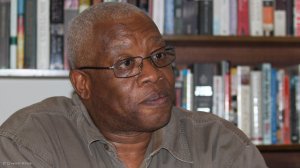The South Africa we fought for is struggling to be reborn. In fact, it is being pushed back into the womb.
As we prepare to celebrate 23 years of democracy, I find myself wondering whether our ancestors are proud of us. Are they proud of what we have become?
They fought against colonial and apartheid oppression in the hope that they would bequeath to us a postcolonial and postapartheid society that would be the antithesis of their colonial reality of dispossession and oppression. Writing elsewhere, and in my speeches, I have argued that anticolonial and antiapartheid struggles were about the creation of a society that would be qualitatively better than the antithesis of the colonial and apartheid reality of our ancestors.
In other words, the 1994 breakthrough was just that – a breakthrough. We must see the advent of liberal democracy in 1994 as a means towards the achievement of a society that, in moral, formal and substantive terms, will be the antithesis of what in some respects is today the antithesis of apartheid society. Therefore, our struggle is not to be qualitatively different from apartheid. Our struggle is to be qualitatively different from what we have become since 1994. We are being called upon to reach beyond the possible. As one Egyptian author put it, while politics is the art of the possible, revolution is the art of the impossible. We must, therefore, judge our achievements and failures since 1994 against this revolutionary task and not be content with doing better than those who oppressed us during apartheid.
To the oppressors and their descendants, reformed and unreformed, this has a meaning that is different from the understanding of those for whom oppression is not an intellectual project and for whom participating in the liberation struggle was not something akin to a sympathy strike.
As the Bible says, the word preceded everything. Let us, for one moment, forget that materialists are not going to agree with this conception of consciousness. What I am saying is that words, spoken and written mainly in English, were very important during the liberation struggle and are now shaping our understanding of what our postapartheid reality should become. For instance, the Freedom Charter tells us that the land of our ancestors belongs to all who live in it. What does this mean? Why was it even necessary to say this? Is this statement as benign as it sounds?
I suspect very strongly the comfort of the oppressed was not uppermost in the mind of the person who concocted this phrase of disenfranchisement. One of the reasons the South Africa we fought for is struggling to be born is the fact that, in the name of nonracial- ism and the illusion of a postracial future, unnecessary compromises were made and some of them are in the Freedom Charter. They may have been necessary in 1955 or during the Convention for a Democratic South Africa, or Codesa, process, but I am convinced of the need to question them because there is a link between them and the antitransformation agenda of those who benefited the most from the compromises.
I accept that it is not always possible to anticipate the impact of compromises. Also, I accept that some of our leaders made the compromises in good faith, while others, voluntarily or otherwise, made them in bad faith. What is important for me is the need not to idealise and venerate the dead, even when circumstances decree that we re-examine their choices. The alternative is to render their mistakes immortal to the detriment of the social, political and economic wellbeing of future generations.
In addition to the word and its attempt to forge a postapartheid reality that is created in the image of its economic interests, we must exorcise our political and economic reality of the demons that have hijacked the African National Congress (ANC).
In defence of white monopoly capital, these demons killed mineworkers in Marikana. Because of the arrogance of their power, the State killed more than 100 mentally ill patients in Gauteng. And, in order to propitiate the gods of all things venal, our government is going to perpetuate an illegality on April 1 when grant recipients get their monies.
So, the third thing that is preventing us from reaching beyond the possible for a post- apartheid reality that is a qualitative improvement is the refusal by too many in our political class and economic elites to live by the moral code that our ancestors left for us.
Put differently, the beneficiaries of apartheid rely on fine-sounding phrases to frame both our narrative and reality, aided quite ably by the betrayal of those in the ANC who are their allies in the task of defying the dreams of our ancestors. The false dimensions of the 1994 consensus must give way to an authentic reality.
EMAIL THIS ARTICLE SAVE THIS ARTICLE ARTICLE ENQUIRY FEEDBACK
To subscribe email subscriptions@creamermedia.co.za or click here
To advertise email advertising@creamermedia.co.za or click here










